 Leading Blog | Posts by Month |
 Leading Blog | Posts by Month |
01.31.14

LeadershipNow 140: January 2014 Compilation
See more on
Posted by Michael McKinney at 02:50 PM
01.30.14

4 Ways Spin Harms Us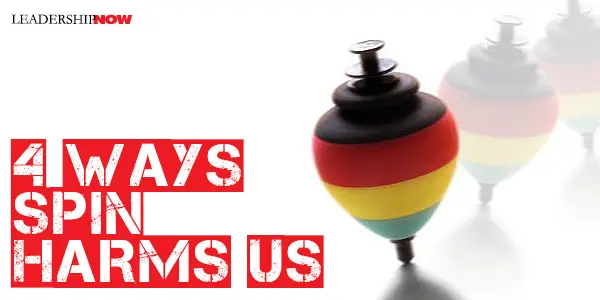
WE ALL SPIN—just a little. We all tell stories in such a way as to make ourselves look good or at the very least understandably wrong. Of course, there’s good spin and bad spin. Each play with reality a bit, but good spin is never a lie. It’s always on the level. It’s designed to highlight the positive and the uplifting. It opens us up to possibilities that were not readily apparent to us. Bad spin is a lie. It misleads and exaggerates. It’s opportunistic; design to benefit the spinner. It distorts reality and narrows our possibilities. It’s short term thinking. It may benefit us in the moment but it spoils us in the future. Bad spin harms us in a number of ways: First of all, it demonstrates a lack of personal responsibility. Rather than facing the facts and dealing with them, it displays our penchant for changing the facts to justify our mistakes. Second, it signals that we are immature in our understanding of success and failure. We should celebrate lessons learned and communicate that mistakes are a part of the growth process. Bad spin communicates that winning is the only thing and is to be valued more than teamwork and support. Third, it nullifies the feedback we get. The feedback we get is critiquing the spin and not the reality—it becomes delusional. Feedback based on spin confirms what we want to believe but it is worthless because it’s critiquing a lie. Only feedback based on reality is helpful. Fourth, it distances us from each other. We become cynical of each other. We lose trust. We lose respect for each other. We want straight answers from each other but we are never sure if we are going to get it. It becomes more difficult to be open, transparent, and non-judgmental. We crave smooth answers in times like these. Uncertainty makes us crave comfortable answers. Fear makes us accepting of reassuring rhetoric. But if it isn’t honest, it only dumbs us down. We can avoid bad spin if we respect each other, seek the truth, welcome growth, and make ourselves and others accountable for what we say and do.
Posted by Michael McKinney at 11:04 PM
01.28.14

Overcoming the Problem of Willpower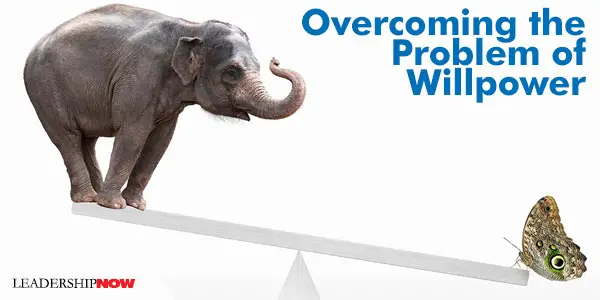
OUR WILLPOWER is simply outmatched by our habits and attitudes. The solution says Caroline Arnold in Small Move, Big Change, is translate your goal into microresolutions—small but meaningful behavioral changes. Instead of commanding yourself to be an organized person or lose weight through willpower—to be what you are not—the idea is to define explicit actions to practice, one by one, until you begin to do what an organized or fit person does automatically. “Microresolutions focus on doing, not being. Being different follows, rather than precedes, deliberate action.” The more change we impose on ourselves, the more resistance we must overcome. And yet we nearly always shoot for an instant transformation, resolving to be slim, to be neat, to be on time. Such wannabe resolutions require changing scores of behaviors and put us broadly at war with autopilot. Arnold’s microresolution system is organized into seven rules: Rule 1: A microresolution is easy. The easier it is, the less you’ll be tempted to talk yourself out of it. Rather than resolving to walk to work every day, an easy microresolution would be to walk to work one day a week. Rule 2: A microresolution is an explicit and measurable action. Your resolution must focus on a specific change of behavior, not a result than can be achieved in multiple ways. Rather than say “eliminate 100 calories a day,” a microresolution to cut a habitual afternoon snack of a candy bar in half is an explicit and measureable action. Rule 3: A microresolution pays off up front. To “lose twenty pounds by summer” does not have an immediate benefit. “Stop eating after 8:00 pm” does. Rule 4: A microresolution is personal. Finding the most effective resolution requires careful self-examination. Rule 5: A microresolution resonates. It’s positive rather than negative. Instead of “I resolve not to be defensive when receiving feedback,” you might reframe it as, “I will listen, acknowledge, and give thoughtful consideration to feedback.” Rule 6: A microresolution fires on cue. Establishing a strong link between an action and its cue is essential for making a new behavior automatic, and a careful framing overall will help you nail your resolution and make practicing it more enjoyable. Rule 7: Make microresolutions just two at a time. Limiting your resolutions ensures that you have the attention and endurance to stick with a behavioral shift until it becomes autopilot. “The art of self-improvement is not about perfection but about priorities,” write Arnold. In part two, Arnold applies these rules to specific areas of self-improvement such as sleep, fitness, diet, clutter, and relationships. Small Move, Big Change is engaging to read and easy to relate to. It will help you overcome the willpower problem and make progress with any changes you’re faced with. 
Posted by Michael McKinney at 10:30 PM
01.20.14

8 Reasons to Seek Out Ambiguity
C Ambiguity makes us uncomfortable so we want things ordered as soon as possible. But if we move too fast, we can miss out on the value that ambiguity brings. We need to embrace ambiguity until we have rung the last drop of value out of it. Ambiguity draws attention to what we don’t know.
Ambiguity and order are tensions to be managed. There is a time and a place for both. Generally speaking, order reproduces—ambiguity creates. Order helps us to leverage our resources. But if we rush too fast to establish order we set ourselves up to repeat the thinking that got us to the point of needing the change in the first place. If we don’t allow ambiguity to do its work, then we might find that the order we establish is incomplete—not well thought out—and doomed to failure. Functioning with ambiguity requires a great deal of emotional intelligence—the ability to control your emotions, perceive other’s emotions and to facilitate the expression and understanding of all emotions. Without ambiguity we become dinosaurs.
Posted by Michael McKinney at 01:36 AM
01.15.14

Leading Views: Pervasive Learning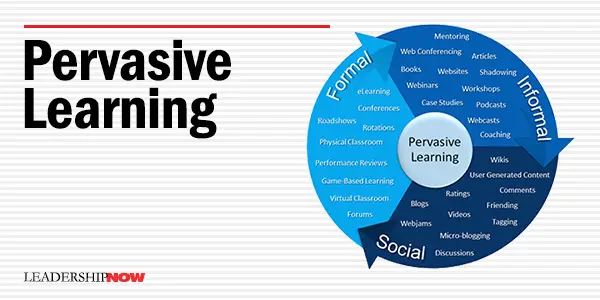
Success in leadership is not about what you know but the knowledge you can access. We need to focus on continuous learning or what Pontefract calls Pervasive Learning: The switch from a “training is an event” fixed mindset to “learning is a collaborative, continuous, connected and community-based” growth mindset. The skills we need now are reflected in this statement from British Columbia’s Ministry of Education: [The current curriculum] tends to focus on teaching children factual content rather than concepts and processes – emphasizing what they learn over how they learn, which is exactly the opposite of what modern education should strive to do. In today’s technology-enabled world, students have virtually instant access to a limitless amount of information. The greater value of education for every student is not in learning the information but in learning the skills they need to successfully find, consume, think about and apply it in their lives. 
Posted by Michael McKinney at 11:14 PM
01.14.14

The 5 Disciplines of Wiki Management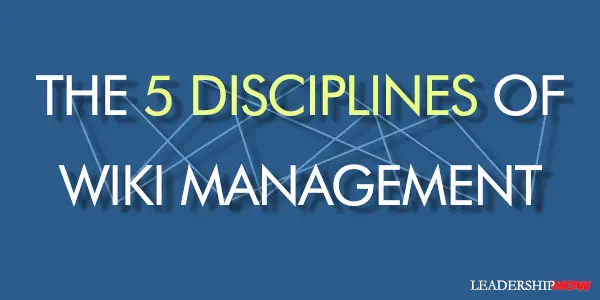
THE world we now live in has forced us to reexamine the way we lead people that gained preeminence during the industrial age and our often immature view of leadership—the “I’m in charge” mentality. Authoritarian leadership implies that the smartest, most valuable people are at the top and so the leader commands and the followers do. Not only is that not true, it’s not sustainable in a world characterized by exponential change. Rod Collins writes in Wiki Management, “Today’s managers may spend more time soliciting input from their workers, but at the end of the day, the basic social technology remains the same: The managers are still the bosses, the workers are still subordinates, and the latter are still expected to do as they are told.”“Wiki” is a Hawaiian term that refers to taking quick action to produce immediate, effective results. Coupled with management, the term offers a way to describe a way of managing designed to help managers keep pace with accelerating change. Collaborative networks are smarter and faster than top-down hierarchies. “Wiki Management assumes that the most effective organizations are highly connected, self-organized networks that are designed to leverage the power of collective intelligence and achieve extraordinary results.” Rather than leaders “acting as controllers who take charge and make the decisions, they assume the roles of facilitators of the discovery processes from which the best decisions emerge.” In general, Wiki Management is about removing inflated ego from the practice of leadership and about breaking down the barriers that define most hierarchies. Collins examines five key disciplines essential to thriving in this “flatter,” highly collaborative landscape:
Collins provides 50 concrete practices to help implement these disciplines and transition your thinking from controller to facilitator. Not everything here is new but what Wiki Management does extremely well, is to guide you through the often counterintuitive thinking that underlies collaborative leadership. It’s leadership that allows people to flourish and can help to detoxify the working environment.

Posted by Michael McKinney at 10:38 PM
01.08.14

5 Leadership Lessons: Amplified Leadership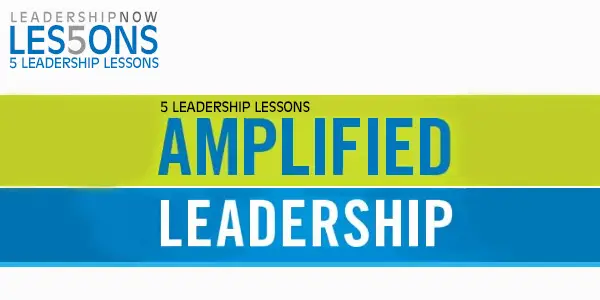
Amplified Leadership by Dan Reiland is about developing leaders. While it is written with a church audience in mind, the principles and values work in other areas as well. It deserves a wider audience. He places the development of leaders into a five-step process: Establish a Relationship, Engage a Follower, Embrace a Team, Coach an Apprentice, and finally, Mentor a New Leader. Here are five lessons from his book:
All of these lessons underscore the need for a leader to be able to develop and maintain good relationships. Not only is leadership about relationships, but the ability to maintain good relationships helps to draw a leader outside of themselves and consider the needs and gifts of others. If we are not surrounded by good relationships our leadership quickly narrows down to and stagnates around our own thoughts. Selfish thoughts then rule our decision making. 
Posted by Michael McKinney at 01:10 AM
01.06.14

Booknotes: 14 Ideas from The Power of Something Stupid The Power of Starting Something Stupid is about finding the courage to do the things you don’t feel you are ready to do. Author Richie Norton explains that life-changing ideas are often tragically mislabeled stupid. What if the key to success, creativity, and fulfillment in your life lies in the potential of those stupid ideas? Stupid is the New Smart—the common denominator for success, creativity, and innovation in business and life. The New Smart is having the ability to discern when the label of "stupid" is masking a smart idea. The Power of Starting Something Stupid is about finding the courage to do the things you don’t feel you are ready to do. Author Richie Norton explains that life-changing ideas are often tragically mislabeled stupid. What if the key to success, creativity, and fulfillment in your life lies in the potential of those stupid ideas? Stupid is the New Smart—the common denominator for success, creativity, and innovation in business and life. The New Smart is having the ability to discern when the label of "stupid" is masking a smart idea.

Posted by Michael McKinney at 11:00 AM
01.03.14

How do Leaders Gain Deep Insights?Reality and truth and hard for leaders to come by—especially if they think they are the repository of all truth. Leaders can easily get swept up in the “truth” perpetuated by the faithful that surround them.Like in Han Christian Anderson’s story, naked kings parade before followers too insecure and fearful to tell them they have no clothes on. These naked kings begin to believe that the world is a fixed landscape that they only truly understand. Nigel Nicholson believes a way out is Management By Wandering Around. He writes in The “I” of Leadership, that “leaders need ways of getting under the wire; to penetrate the defenses and illusions that thickly sprout around all the interstices of power in organizations.” Napoleon sleeping, wrapped in a blanket on the battlefield alongside his men; Gates inviting emails from the ranks of his global Microsoft empire; company patriarch Raymond Ackerman continually touring the stores of his South African Pick-n-Pay grocery chain; and numerous hands-on business leaders the world over walking the job in an unscheduled, intimate manner, chatting to their people. Gaining insight means: Getting out and talking to people you don’t normally rely on for information. For better or worse, Nicholson explains that people tell their leaders what they want to hear in order to be thought of well, to keep them confident in their own beliefs and out of the fear to remain on the winning side. Unfortunately, while this keeps the leader comfortable and warm, it also makes them delusional. The leader must break organizational designs that conspire to “separate leaders from their people and the truths they have to tell.” Gaining insight means cultivating quality feedback. Of course, all of this makes the issue of humility that much more difficult. Without humility we can’t learn and become stuck in a cycle of repeating the same thinking and patterns of behavior we always have—often to our own detriment. Nicholson writes, “the best bosses teach their people that they really do love the truth and are not afraid of it, even when it may reflect badly on them, but many doubletalk, like the remark of the legendary movie mogul, Sam Goldwyn, who reputedly said:” I don’t want yes men around me. I want people to tell me the truth, even if it costs them their jobs. 
Posted by Michael McKinney at 01:12 PM
01.01.14

First Look: Leadership Books for January 2014Here's a look at some of the best leadership books to be released in January.




For bulk orders call 1-800-423-8273  Build your leadership library with these specials on over 120 titles. All titles are at least 40% off the list price and are available only in limited quantities.
Posted by Michael McKinney at 12:55 AM
|
BUILD YOUR KNOWLEDGE


How to Do Your Start-Up Right STRAIGHT TALK FOR START-UPS 
Grow Your Leadership Skills NEW AND UPCOMING LEADERSHIP BOOKS 
Leadership Minute BITE-SIZE CONCEPTS YOU CAN CHEW ON 
Classic Leadership Books BOOKS TO READ BEFORE YOU LEAD |
|